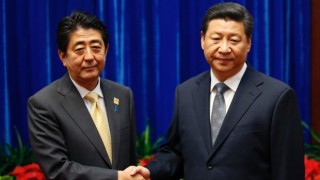Loading
Search
▼ Japan and China leaders hold 1st face-to-face talks
- Category:Other

CBC
With an awkward handshake, Chinese President Xi Jinping and Japanese Prime Minister Shinzo Abe held formal talks on Monday for the first time since the two leaders took office, a breakthrough in efforts to improve ties between the Asian rivals.
Television footage showed Abe waiting for Xi to greet him at Beijing's Great Hall of the People, a departure from usual protocol in which the Chinese leader is on hand waiting for a guest. Xi was unsmiling and stiff as the two shook hands and he did not speak to Abe when they first met.
China and Japan, the world's second- and third-largest economies, have rowed bitterly in the past two years over disputed islands, regional rivalry and the legacy of Japan's wartime occupation of China.
The meeting between Abe and Xi came after top diplomats agreed last week to work on improving ties and signalled willingness to put their rival claims over the islands on the back burner.
"This is a first step toward improving bilateral relations, returning to the core of a mutually beneficial relationship based on common strategic interests," Abe told reporters after the meeting on the sidelines of the Asia-Pacific Economic Cooperation (APEC) leaders gathering.
Japan investment in China falling
Experts have said both sides had agreed the deep freeze in diplomatic ties was harming vital economic relations as well as threatening an unintended military clash that could drag in the United States. Japan's direct investment into China fell more than 40 per cent during the first nine months of the year.
Gerry Curtis, a Columbia University professor, said Xi's apparent stiffness in greeting Abe was a nod to his domestic audience, where memories of Japan's wartime occupation persist.
"Xi had to be concerned about how the meeting was covered in China," he said. "Looking like he was meeting his best friend would probably not go down all that well."
But Curtis also said body language aside, the meeting was an "important and positive development" toward repairing ties.
Nevertheless, rebuilding trust between the long-time rivals will not be easy.
Xi told Abe that "historical issues concern the feelings of more than 1.3 billion Chinese people" and urged Abe "to continue the path of peaceful development and adopt a prudent military security policy", China's foreign ministry said.
Talks did not include controversial war shrine
China, which has bitter memories of the Japanese occupation, has sought assurances that Abe would not repeat his December 2013 visit to Tokyo's Yasukuni Shrine for the war dead. Such a promise would be hard for Abe to make, however, and the Japanese leader said last Friday that last week's agreement did not cover specific issues such as his shrine visits.
Japan's Deputy Chief Cabinet Secretary Katsunubo Kato said there was no direct mention of the disputed isles or the Yasukuni shrine at the talks.
Abe said both leaders agreed to start preparations for a maritime crisis mechanism, designed to prevent clashes at a time when patrol ships and fighter jets from both countries shadow each other regularly near the disputed islands in the East China Sea that are controlled by Japan but also claimed by Beijing.
However, Abe has previously said that there had been no change in Japan's stance on the isles. China's top diplomat, Yang Jiechi, has urged Japan to properly address sensitive issues like history and the islands.
- November 11, 2014
- Comment (0)
- Trackback(0)

